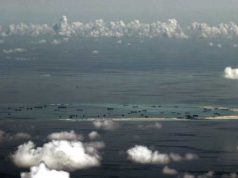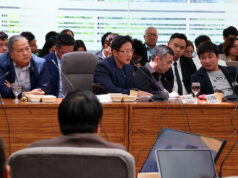Proximity ties PHL to Taiwan dispute with China — analyst

SOVEREIGNTY and security issues in Taiwan, including any escalation of military movements by China, is more likely to affect the Philippines because of their commonalities in maritime space and defense alliances, an analyst said.
“Taiwan and the West Philippine Sea are two separate issues. But if you look at the geographic location, it’s actually quite near to each other. And there’s some connections in terms of its maritime space,” Robin Michael U. Garcia, president and CEO of WR Advisory Group, said at a forum in Makati City on Monday.
China claims the South China Sea almost in its entirety, including areas that are well within Manila’s exclusive economic zone (EEZ). It has sanctioned the Chinese Coast Guard’s dangerous maneuvers and deployment of water cannons to block Philippine resupply and rotation missions to Manila’s outpost in Second Thomas Shoal (Ayungin).
Recently, China has launched military drills to simulate an attack on Taiwan, which it regards as its renegade province, describing it a “dangerous separatist.”
Taiwan has governed independently of China since 1949, but just days after the inauguration of its new head of state, President William Lai, military drills were launched by Beijing.
As in the case of the Philippines, the US is also Taiwan’s bulwark against Beijing’s diplomatic and military pressure.
“In some way, it (the Philippines) is connected to Taiwan,” Mr. Garcia said.
Mavudis, which is part of the Batanes group of islands, is just about 140 km from Eluanbi, Taiwan’s southernmost tip.
Batanes was among the key sites of US-Philippines military drills conducted from Apr. 24 to May 8.
In March, the Philippines reported the presence of a Chinese research vessel in Benham Rise, a 24-million-hectare underwater feature within the Philippines’ continental shelf, in a move that experts said could be part of Beijing’s underwater surveys in preparation for a potential invasion of Taiwan.
At the forum, WR CEO and President Cleve V. Arguelles said in the event of an unarmed conflict between China and Taiwan, 86% of Filipinos want the Philippines to remain neutral.
He cited a WR Numero poll of 1,765 Filipino adults in March, in which 65% of respondents said the tension in the West Philippine Sea is worsening.
Of the respondents, 68% said the Armed Forces of the Philippines was managing the tension “very well,” while 33.2% said the government of President Ferdinand R. Marcos, Jr. was doing well.
Mr. Arguelles warned China has been taking advantage of “elite factionalism” in fragile democracies such as the Philippines, whose many citizens believe the government should focus on resolving domestic issues including soaring living costs and lack of economic opportunities “rather than actively participating in international issues.”
“Some actors, some forces, may take advantage of this prevailing attitude among Filipinos,” he said. “Many Filipinos would rather that we focus on domestic issues.”
Despite concerns on increasing tension in the West Philippine Sea, “only 14% of Filipinos say that China’s aggression in the West Philippine Sea must be given priority by the government,” Mr. Arguelles added, noting it may be a challenge for the government to get public support for its efforts against Chinese intrusions into Philippine waters.
In the same survey, 27.8% said they didn’t trust Chinese President Xi Jinping, higher than the distrust rate of 11.8% for US President Joseph R. Biden and 19.3% for Russian President Vladimir Putin.
Mr. Arguelles urged Philippine policymakers and civil society to closely monitor China’s potential interference in the 2025 midterm polls and the first parliament elections in the Bangsamoro region this year.
Philippine Coast Guard Commandant Jay Tristan Tarriela said earlier this month modernization efforts for the country’s coast guard and armed forces as well as budget allocation for its territorial defense are at stake in 2025.
Meanwhile, in the event of an escalation of tensions or even a potential invasion of Taiwan by China, the Philippine migrant affairs chief said at the weekend that it has prepared measures to repatriate migrant Filipino workers.
“We are always ready,” Department of Migrant Workers acting Secretary Hans Leo J. Cacdac said in a briefing last Saturday. — Kyle Aristophere T. Atienza



